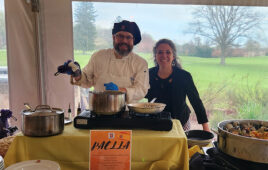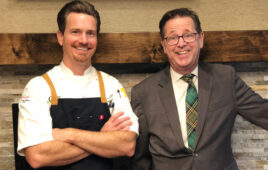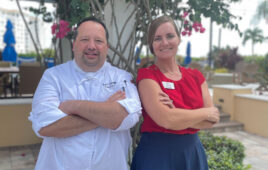More credibility and a dedication to education are among the top reasons chefs seek certification.
With thousands of culinarians competing in the job market, a growing number of club chefs are proving their culinary competency by earning certifications through the American Culinary Federation (ACF).
According to the ACF, a Certified Executive Chef (CEC) on average earns $10,000 more a year than executive chefs who are not certified. But many chefs who have successfully earned the designation are quick to add that the motivation behind achieving certification is rarely about pay.
“I think the biggest advantage for me in being a CEC is the credibility it gives me with my staff,” says Eric DaRin, CEC, Executive Chef of Dunwoody Country Club in Atlanta, Ga. “They watched me prepare and practice for the exam. They saw my dedication and work ethic, and it motivated them to be better.”
For DaRin, the whole process took about a year, while he was simultaneously balancing Dunwoody’s $3 million food-and-beverage operation.
“Getting your certification is always going to help and never going to hurt,” says DaRin.
A handful of club and resort properties, like The Sanctuary Golf Club (Sanibel Island, Fla.) and Pebble Beach (Calif.) Resorts, actually prefer to hire chefs who are certified. In their eyes, certification demonstrates a benchmark of excellence. It motivates the team to participate in professional development and remain relevant. It improves recruiting and retention success while reducing training costs. And it supports food safety, risk prevention and sustainability practices.
“We prefer certifications because [those who earn them] show a level of dedication to education and training and to bettering themselves,” says Michelle Cote, Human Resources Director of The Sanctuary Golf Club (Sanibel Island, Fla.), where Daniel Scannell, a Certified Master Chef, serves as Executive Chef. “It shows that the chef is invested.”
At the same time, there are many successful club and resort chefs who don’t have certifications but are dynamic leaders. So what drives a chef to get certified, especially on a master-chef level?
“I was fortunate to work for a Certified Master Chef,” says Jonathan Moosmiller, CMC, Executive Chef of Southern Hills Country Club, Tulsa, Okla. “Certification was something I always wanted to achieve. When I came to Southern Hills, they had a very clear idea of where they wanted me to take their food-and-beverage program. They also knew how important the test was to me. Once I was able to elevate the program, they fully supported me working toward CMC certification.”
Moosmiller came to Southern Hills CC in 2012 and earned his Certified Master Chef certification in the fall of 2014 (“Continued Mastery,” C&RB, January 2015).
“[Other] CMCs had told me that getting the certification was the easy part,” says Moosmiller. “The difficult part is living up to the title on a daily basis. It forces you to step back and look at your operation differently. It makes you ask yourself: Is this the best we can do? Is this the most efficient?”
Brian Beland, CMC, Executive Chef and Food & Beverage Manager of the Country Club of Detroit (CCD), Grosse Pointe Farms, Mich. (“Taking the Broad View,” C&RB, February 2016), also says that obtaining certification was just the beginning of his journey. Like Moosmiller, Beland feels that the real challenge comes through being able to sustain continued growth.
“Becoming a CMC has helped me to become a further engaged professional,” he says. “It’s made my role as a chef more challenging, because it forces me to keep pushing.”
Beland believes he stays relevant by cooking really good food for his members. In fact, he used them as a platform to prepare for his test—something CCD fully embraced and supported.
“I built social events and menus around my studies and practices,” says Beland. “Board Dinners became monthly Market Basket Practices. I set up Regional and Global Dinners to study the various cuisines. I cooked family meals for the staff to explore flavor more in-depth. I practiced butchery by bringing in whole fish, whole lambs, and pigs in place of boxed meats when the opportunity arose. It was a win for everyone.”
For all of these chefs’ clubs, having a certified chef has been a point of differentiation.
“Very few clubs have a CMC, so Southern Hills promotes that and uses it as a bragging point,” says Moosmiller. “It’s something members latch onto. It speaks to the quality of our cuisine.”





